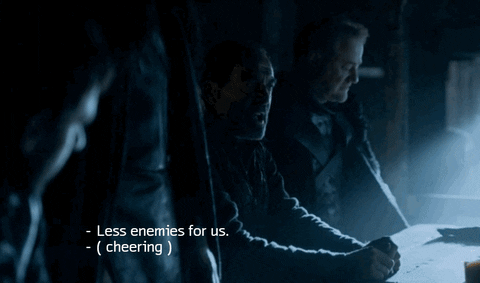Alright, Let’s Settle “Less” vs. “Fewer” Once and for All
Does it infuriate you when someone says, “I could care less”?
How about calling an Espresso an EXpresso?
Or people who literally have no idea how to use the word literally correctly?
Well, if one or all of these things really eat away at you, that’s exactly how I feel about the misuse of less and fewer.
Before I was a copywriter, I never paid it much attention. But in recent times, the confusion around these two little words has really started to grate on me. So much so, that these days I’m frequently biting my tongue to avoid correcting people in polite conversation.
Yes, sadly, I’m becoming that guy.
But it’s not just me: it also famously ground the gears of the Lord Of Dragonstone and impromptu grammar tutor Stannis Baratheon.
Stannis might have failed to claim the Iron Throne, but at least the man was good with his words.
(Oh, how I miss the Game of Thrones glory days - but that’s one for another time.)
In a very broad sense, less and fewer mean the same thing. But they each have a place, and knowing the difference is all part of speaking our beautiful (and at times, confusing) language with the glorious precision it deserves.
If your memory for obscure 90s movie references is as good as mine, you may also recall the title of Tom Cruise’s mission statement in Jerry Maguire:
(The document did get Jerry fired, but at least his grammar was on point.)
So how do you use less and fewer correctly? Well, it more or less boils down to two simple rules.
Rule #1 – Can It Be Counted?
This is the easiest and fastest way to work out which one is correct. Is it a collective that you can’t quantify - such as time, money, or water? Or is it something that you can count individually - such as apples, spoons, or chairs?
Here are some basic examples:
Less coffee. Fewer coffee cups.
Less money. Fewer coins.
Less fruit. Fewer bananas.
Less water. Fewer water bottles.
Once you take a moment to understand the rule, it suddenly makes a lot more sense. And while many people are set in default ‘less’ mode for almost everything, “fewer” is the correct word to use in quite a lot of cases.
Rule #2 – It’s Basically “Many” and “Much”, but in Reverse
While lots of us struggle with less and fewer, none of us seem to have a problem with much and many – even though they essentially follow the same rules.
Take a moment to appreciate how downright bizarre the following sentence sounds with the two words swapped around:
“It took so many time to finish the assignment, I lost count of how much cups of coffee I drank.”



